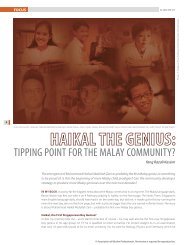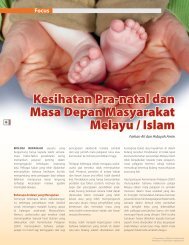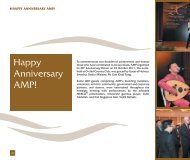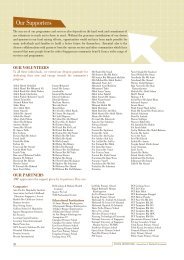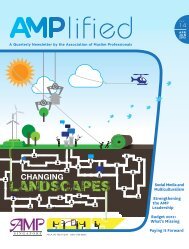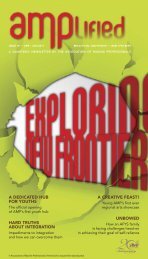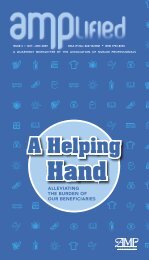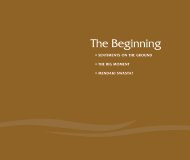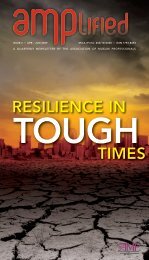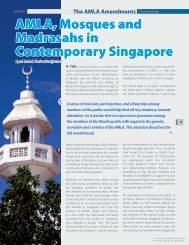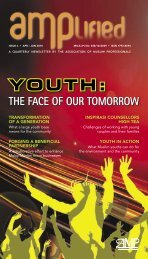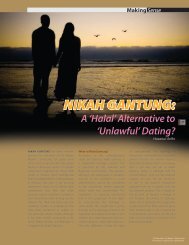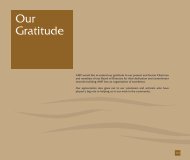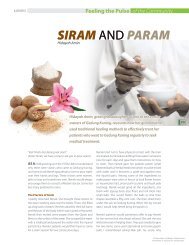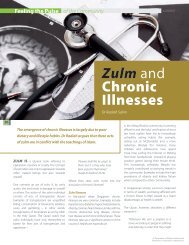The AMLA Amendments - Association of Muslim Professionals
The AMLA Amendments - Association of Muslim Professionals
The AMLA Amendments - Association of Muslim Professionals
You also want an ePaper? Increase the reach of your titles
YUMPU automatically turns print PDFs into web optimized ePapers that Google loves.
KARYAWAN<br />
Book Review<br />
<strong>The</strong> Origins<br />
and<br />
Evolution <strong>of</strong><br />
Islamic Law<br />
by Wael Hallaq<br />
Review by Mohd Suhaimi Ismail<br />
‘Hallaq, in his book,<br />
“<strong>The</strong> Origins and<br />
Evolution <strong>of</strong> Islamic<br />
Law”, gives a very<br />
detailed historical<br />
narrative on the<br />
circumstances under<br />
which Islamic law<br />
has evolved into the<br />
corpus <strong>of</strong> legislation<br />
that we know now.‘<br />
RECENTLY THE <strong>Muslim</strong> community saw amendments to the Administration <strong>of</strong><br />
<strong>Muslim</strong> Law Act (<strong>AMLA</strong>). <strong>AMLA</strong> is a regulatory framework in recognition <strong>of</strong> the needs<br />
<strong>of</strong> <strong>Muslim</strong>s in Singapore to abide by certain Islamic laws. Some within the community<br />
wondered whether the proposed amendments were far-reaching enough. Against<br />
this backdrop, this book by Wael Hallaq, one <strong>of</strong> the world’s leading scholars on Islamic<br />
jurisprudence, should be timely. It helps us to understand the origin and evolution<br />
<strong>of</strong> the body <strong>of</strong> Islamic Laws that <strong>AMLA</strong> draws upon for a range <strong>of</strong> provisions such as<br />
inheritance, divorce and marriage.<br />
Wael B. Hallaq is a James McGill Pr<strong>of</strong>essor <strong>of</strong> Islamic Law, teaching at the Institute <strong>of</strong><br />
Islamic Studies, McGill University. He authored several books on Islamic Law such as<br />
“Ibn Taymiyya Against the Greek Logicians (1993)”, “A History <strong>of</strong> Islamic Legal <strong>The</strong>ories<br />
(1997)” and “Authority, Continuity and Change in Islamic Law (2001)”. Though not a<br />
<strong>Muslim</strong>, he has in-depth experience in the research <strong>of</strong> Islamic jurisprudence and has<br />
been invited on several occasions by institutions <strong>of</strong> higher learning and organisations<br />
in Singapore to lecture on the subject.<br />
Hallaq, in his book, “<strong>The</strong> Origins and Evolution <strong>of</strong> Islamic Law”, gives a very detailed<br />
historical narrative on the circumstances under which Islamic law has evolved into<br />
the corpus <strong>of</strong> legislation that we know now. He started by painting the environment<br />
that existed prior to Islam. In the pre-Islamic era <strong>of</strong> the Hejaz area, i.e. the Arab<br />
Peninsula consisting <strong>of</strong> Medina and Mecca, the residents had in-depth knowledge <strong>of</strong><br />
customs and traditions. This included the social laws <strong>of</strong> various communities in such<br />
regions as those belonging to the Sasanid and Byzantine empires to the north <strong>of</strong> the<br />
Peninsula and the Yemenite empire to the south. This was due to the commercial<br />
activities <strong>of</strong> the Arabs and those communities, in addition to the residents’ own<br />
traditions and customs.<br />
39



